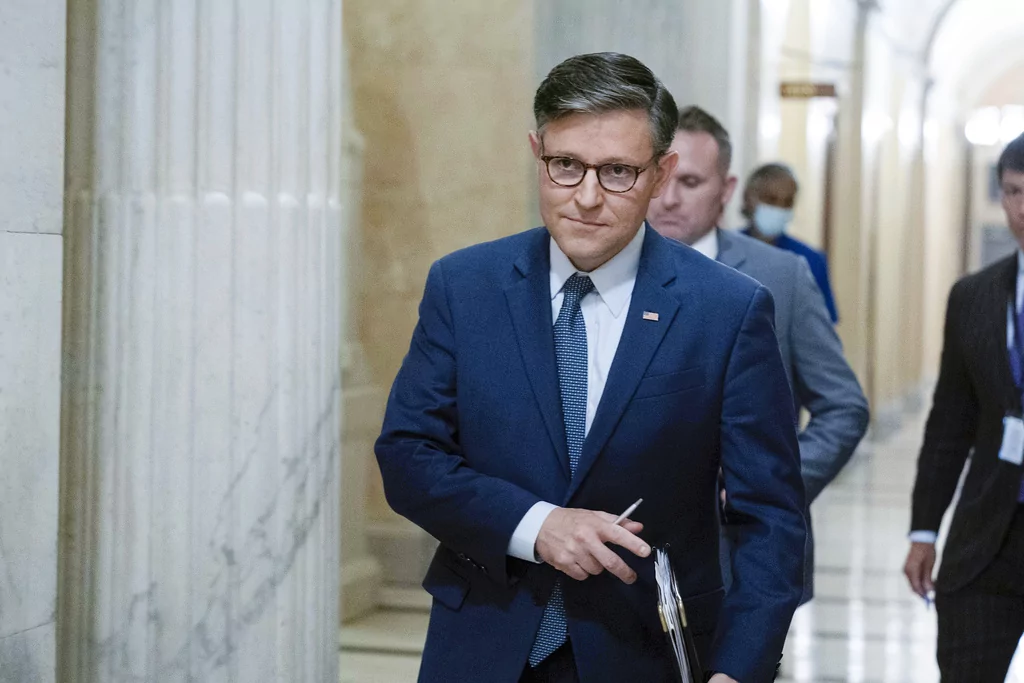

House Republicans are moving forward with plans to vote on a clean stopgap spending bill that will extend government funding until mid-December, dropping a proof-of-citizenship voting measure backed by former President Donald Trump from their latest proposal.
The continuing resolution, released on Sunday, would continue current spending levels until Dec. 20, buying lawmakers time to continue negotiations for the federal budget for the 2025 fiscal year. The proposal comes after the House failed to pass its initial government funding proposal last week that would have extended current spending levels until the end of March 2025 and included a voting integrity measure known as the SAVE Act that Speaker Mike Johnson (R-LA) sought to attach as a policy win for Republicans.
That spending package was shot down after it failed to garner enough support from GOP lawmakers who vowed never to support a temporary government funding bill.
“Since we fell a bit short of the goal line, an alternative plan is now required,” House Speaker Mike Johnson (R-LA) wrote in a Dear Colleague letter to lawmakers on Sunday. “The feedback and ideas from everyone have been very helpful, and next week the House will take the initiative and pass a clean, three-month CR to prevent the Senate from jamming us with a bill loaded with billions in new spending and unrelated provisions. Our legislation will be a very narrow, bare-bones CR including only the extensions that are absolutely necessary.”
But the absence of the SAVE Act could prompt several Republicans in both the House and Senate to reject the stopgap measure. Former President Donald Trump has repeatedly called on Republicans to oppose any funding bill that does not include language of the SAVE Act, even at the risk of a shutdown.
Johnson met with Trump last week to discuss plans for funding the government, although the details of that conversation remain unclear. However, Trump emerged from that meeting reiterating calls for a shutdown if SAVE Act isn’t passed and Johnson has moved forward with a three-month extension.
Still, GOP leaders are painting the three-month CR as a win for Republicans, arguing they were able to fight off Democratic demands for increased funding and instead kept spending at the same levels. Johnson is also framing the stopgap measure as being the fault of Senate Democrats, whom they argue have failed to pass any sort of appropriations bill so far this year.
“Because the end of the fiscal year is upon us, and Senate Democrats failed to pass a single appropriations bill or negotiate with the House on an acceptable topline number for FY 2025, a continuing resolution is the only option that remains,” Johnson wrote in his letter.
The continuing resolution does not include any additional spending for most government departments, according to text of the legislation that was released on Sunday. For example, the six-month CR would have included extra funds for disaster relief that will not be attached to the three-month package.
That decision was made because of the shorter timeframe, according to House GOP leadership sources, who say that funding will be finalized in the December package.
However, the bill will allocate additional funding to the Secret Service to boost the agency’s budget and its security protections of presidential candidates ahead of the November election. The clean CR will include $230 million for the agency, according to House Republican leadership staff.
CLICK HERE TO READ MORE FROM THE WASHINGTON EXAMINER
It’s not yet clear when the CR will be brought to the House floor, although GOP leadership is hoping to vote on the bill by Wednesday at the latest. The legislation would then head to the Senate for consideration before being signed by President Joe Biden.
Federal funding is set to lapse at midnight on Oct. 1, giving Congress just over a week to pass some sort of spending deal.






